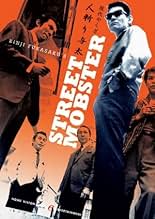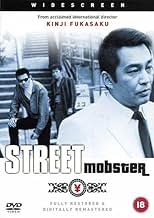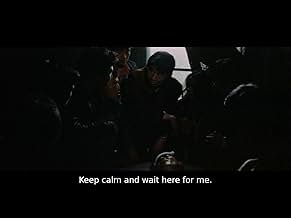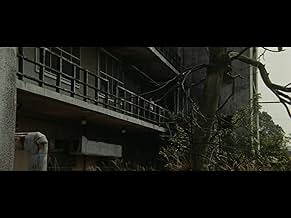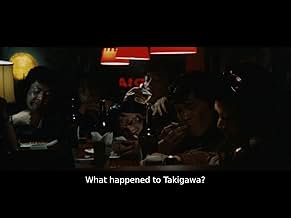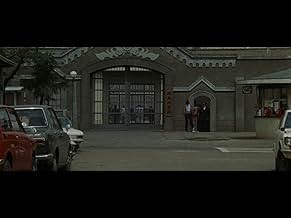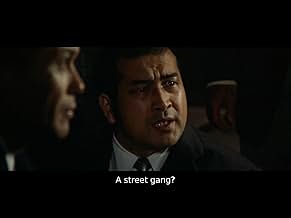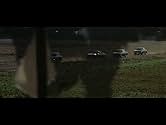AVALIAÇÃO DA IMDb
7,1/10
1,3 mil
SUA AVALIAÇÃO
Adicionar um enredo no seu idiomaA yakuza, who has an untamed rage and lack of respect for authority, finds himself leading the remnants of the gang he once belonged to in order to secure an area of their own.A yakuza, who has an untamed rage and lack of respect for authority, finds himself leading the remnants of the gang he once belonged to in order to secure an area of their own.A yakuza, who has an untamed rage and lack of respect for authority, finds himself leading the remnants of the gang he once belonged to in order to secure an area of their own.
- Direção
- Roteiristas
- Artistas
- Direção
- Roteiristas
- Elenco e equipe completos
- Produção, bilheteria e muito mais no IMDbPro
Avaliações em destaque
As can be expected from Japanese master Kinji Fukasaku, "Street Mobster" is a fast paced, stylistic and violent depiction of a low level Yakuza thug who punches to the beat of his own fist.
Bunta Sugawara plays Okita, a small time hood recently released from prison. Upon his arrival to the outside world, he finds the underworld he left behind changed. A new crew runs his old stomping grounds, and he is lost and abandoned. After teaming up with some hoodlums, Okita sets his sights on bigger things, which all leads to his downward spiral in the Japanese underworld.
Fukasaku directs this Yakuza flick with his usual visual tour de force. You can expect freeze frames, quick cuts, fast zooms, hand- held camera work, dutch angles, voice overs, a mixture of b&w and color cinematography, etc. The energy that the director supplies from behind the camera perfectly captures the momentum in which the lead characters react to their daily lives. There is a lot of action, with characters often breaking out into fights and chases at random. This kind of film needs to be taken with a grain of salt. The violence, like the melodrama and tacked on love interest, are over the top but enjoyable.
So sit back and relax. This lean, mean, fast flying fist machine of a film will keep you entertained and enthralled throughout.
Bunta Sugawara plays Okita, a small time hood recently released from prison. Upon his arrival to the outside world, he finds the underworld he left behind changed. A new crew runs his old stomping grounds, and he is lost and abandoned. After teaming up with some hoodlums, Okita sets his sights on bigger things, which all leads to his downward spiral in the Japanese underworld.
Fukasaku directs this Yakuza flick with his usual visual tour de force. You can expect freeze frames, quick cuts, fast zooms, hand- held camera work, dutch angles, voice overs, a mixture of b&w and color cinematography, etc. The energy that the director supplies from behind the camera perfectly captures the momentum in which the lead characters react to their daily lives. There is a lot of action, with characters often breaking out into fights and chases at random. This kind of film needs to be taken with a grain of salt. The violence, like the melodrama and tacked on love interest, are over the top but enjoyable.
So sit back and relax. This lean, mean, fast flying fist machine of a film will keep you entertained and enthralled throughout.
This movie is the life story of a punk named Isamu--with the bulk of it following his insane path following his release from prison. While the idea of a mobster being a sociopath is no surprise, Isamu is peculiar even among the yakuza. This is because he also has an insane need for excitement and is incredibly self-destructive and angry--so much so that you know he cannot continue his path for long. After all, taking on the yakuza (sort of like the Japanese mafia) nearly single-handedly is just plain nuts! Yet, this crazed punk assembles a very small gang and attempts to do just that!
"Street Mobster" is one of the most violent and nihilistic Japanese films I have ever seen. Its violence is vicious, uncaring and filled with pure rage. And, as a portrait of a thug, it IS effective and realistic. But, with graphic rapes, stabbing after stabbing after stabbing, it makes you wonder who the audience would be for this blood-fest. Plus, after raping one woman, the lady then has a twisted love-hate relationship with him that is just plain unsavory. Not a movie I enjoyed and one I am loathe to recommend because it's so nasty, but it IS unflinching and pulls no punches.
"Street Mobster" is one of the most violent and nihilistic Japanese films I have ever seen. Its violence is vicious, uncaring and filled with pure rage. And, as a portrait of a thug, it IS effective and realistic. But, with graphic rapes, stabbing after stabbing after stabbing, it makes you wonder who the audience would be for this blood-fest. Plus, after raping one woman, the lady then has a twisted love-hate relationship with him that is just plain unsavory. Not a movie I enjoyed and one I am loathe to recommend because it's so nasty, but it IS unflinching and pulls no punches.
Street Mobster is among my favorite yakuza films, and from one of my favorite Japanese directors. This is a great, less-popular Fukasaku film, and it really deserves more attention.
Okita is our "hero", if you can call him that. He's hot-heated, violent, and unapologetic. I can't think of a time in the film where he really shows restraint. He's just such an over-the-top, punk rockin' character who doesn't care about rival gangs or other thugs; he wants to do what he wants, when he wants to. And that's definitely the driving force behind the film, it's explosive nature. It's so unglamorous and filthy at times, and yet you have this sense of a man living his life, maybe not to it's full potential, but having a hell of a lot of fun doing what he's doing. And maybe he's not even enjoying it, everything else is just too conformist for him. He simply doesn't back down. So he really is a hero, a hero to the downtrodden. A counterculture icon, a raging machine.
With it's boisterous protagonist comes a slew of background characters who are really just there to make Okita the centerpiece. Aside from the prostitute that he raped years earlier and now forms a bond with (Whose name I can't even remember!) there are few other noteworthy characters. And that's really okay. When they speak, they speak to get Okita's reaction. If you don't like Okita, then you're probably not going to like the film. Me, I enjoyed this rebellious, non-conformist gangster, yelling and picking fights. It was just so over-the-top and the director clearly embraced the punk style that was emerging at the time of this film's release.
Speaking of release time, I just watched the film again a few minutes ago, and I still can't believe it was made in 1972. I'm sure you've heard it before, but it's way ahead of it's time. It looks 90s-ish to me. The shaky-cam and jump cuts stand out most as then-foreign techniques. Of course, now they've become the norm in films.
So that's my short review. I don't feel that there's a whole lot more ground to cover as Okita is really the main attraction. So if you're looking to kill 87 minutes and consider yourself a fan of exciting cinema, look no further than Street Mobster.
Okita is our "hero", if you can call him that. He's hot-heated, violent, and unapologetic. I can't think of a time in the film where he really shows restraint. He's just such an over-the-top, punk rockin' character who doesn't care about rival gangs or other thugs; he wants to do what he wants, when he wants to. And that's definitely the driving force behind the film, it's explosive nature. It's so unglamorous and filthy at times, and yet you have this sense of a man living his life, maybe not to it's full potential, but having a hell of a lot of fun doing what he's doing. And maybe he's not even enjoying it, everything else is just too conformist for him. He simply doesn't back down. So he really is a hero, a hero to the downtrodden. A counterculture icon, a raging machine.
With it's boisterous protagonist comes a slew of background characters who are really just there to make Okita the centerpiece. Aside from the prostitute that he raped years earlier and now forms a bond with (Whose name I can't even remember!) there are few other noteworthy characters. And that's really okay. When they speak, they speak to get Okita's reaction. If you don't like Okita, then you're probably not going to like the film. Me, I enjoyed this rebellious, non-conformist gangster, yelling and picking fights. It was just so over-the-top and the director clearly embraced the punk style that was emerging at the time of this film's release.
Speaking of release time, I just watched the film again a few minutes ago, and I still can't believe it was made in 1972. I'm sure you've heard it before, but it's way ahead of it's time. It looks 90s-ish to me. The shaky-cam and jump cuts stand out most as then-foreign techniques. Of course, now they've become the norm in films.
So that's my short review. I don't feel that there's a whole lot more ground to cover as Okita is really the main attraction. So if you're looking to kill 87 minutes and consider yourself a fan of exciting cinema, look no further than Street Mobster.
Bunta Sugawara plays a low-level criminal who keeps getting in trouble with a major yakuza clan. After a ton of screwing around with them, a second yakuza clan adopts him as one of their own. At first, everyone's happy about it, but soon enough, Sugawara feels trapped and starts to act out. This, of course, does not please his bosses. The main problem with this one is that Sugawara's character is just so unlikable - you have to wonder why the yakuza on either side keep letting him screw around so much. The mobsters from The Godfather would have whacked him instantly (especially since he's essentially a nobody; he has a few followers, but they're just punks, too). The value of the film comes from Fukasaku's direction, which seems revolutionary for 1972, almost Jason Bourne-like with hand-held cameras, thrusting the audience in the kinetic action sequences. The direction is definitely some of Fukasaku's best work.
Street Mobster is a violent Japanese gangster movie by prolific director Fukasaku Kinji who would later on direct influential genre masterpieces such as Battles Without Honor and Humanity, Graveyard of Honor and Yakuza Graveyard. Western audiences know him as the director of dystopian action thriller Battle Royale which was the last movie he was able to complete.
The story of this movie is rather simple. It follows the life of a violent gangster who attacks the members of an inflluential clan who try to extort money from him and associates. He spends some time in prison but soon forms a new gang that is particularly violent. He ultimately gets injured and is temporarily forced to join a bigger family for protection. When another and even bigger family from Osaka tries to increase its influence in Kawasaki, the film's violent antagonist decides to disrespect common conventions and brutally disrespects the different gangster families. The three involved families come to the only reasonable conclusion: they must cooperate to eliminate the antagonist and his associates to preserve peace.
The most interesting element about Street Mobster is its violent, nihilistic and egoistic antagonist who isn't interested in compromises, peace or truces. He desires to become the biggest gangster boss in the country by any means necessary. While this character is extremely dislikeable, he is brutally consequent and honest in his actions and therefore more complex and profound than one might think at first contact. The movie impresses with numerous violent scenes supported by dynamic camera work that have aged rather well and can still be considered offensive nowadays. The film has frantic pace and entertains from start to finish.
On the negative side, there are very few characters to sympathize or empathize with. As opposed to Western gangster movies, even the victims and outsiders in organized crime come off as careless and despicable. The story is also extremely thin and quite predictable. The action scenes are quite intense but also rather repetitive. The movie impresses at first contact but lacks creativity, depth and diversity.
To conclude, you should watch Street Mobster if you are looking for a particularly brutal, entertaining and fast gangster movie that has stood the test of time. This film certainly entertains while it last but doesn't leave any deeper impression due to its thin story line. Street Mobster is a feast for genre fans but can't compete with Fukasaku Kinji's later works.
The story of this movie is rather simple. It follows the life of a violent gangster who attacks the members of an inflluential clan who try to extort money from him and associates. He spends some time in prison but soon forms a new gang that is particularly violent. He ultimately gets injured and is temporarily forced to join a bigger family for protection. When another and even bigger family from Osaka tries to increase its influence in Kawasaki, the film's violent antagonist decides to disrespect common conventions and brutally disrespects the different gangster families. The three involved families come to the only reasonable conclusion: they must cooperate to eliminate the antagonist and his associates to preserve peace.
The most interesting element about Street Mobster is its violent, nihilistic and egoistic antagonist who isn't interested in compromises, peace or truces. He desires to become the biggest gangster boss in the country by any means necessary. While this character is extremely dislikeable, he is brutally consequent and honest in his actions and therefore more complex and profound than one might think at first contact. The movie impresses with numerous violent scenes supported by dynamic camera work that have aged rather well and can still be considered offensive nowadays. The film has frantic pace and entertains from start to finish.
On the negative side, there are very few characters to sympathize or empathize with. As opposed to Western gangster movies, even the victims and outsiders in organized crime come off as careless and despicable. The story is also extremely thin and quite predictable. The action scenes are quite intense but also rather repetitive. The movie impresses at first contact but lacks creativity, depth and diversity.
To conclude, you should watch Street Mobster if you are looking for a particularly brutal, entertaining and fast gangster movie that has stood the test of time. This film certainly entertains while it last but doesn't leave any deeper impression due to its thin story line. Street Mobster is a feast for genre fans but can't compete with Fukasaku Kinji's later works.
Você sabia?
- ConexõesFeatured in Yakuza Eiga, une histoire du cinéma yakuza (2009)
Principais escolhas
Faça login para avaliar e ver a lista de recomendações personalizadas
Detalhes
- Data de lançamento
- País de origem
- Central de atendimento oficial
- Idioma
- Também conhecido como
- Street Mobster
- Empresa de produção
- Consulte mais créditos da empresa na IMDbPro
Contribua para esta página
Sugerir uma alteração ou adicionar conteúdo ausente

